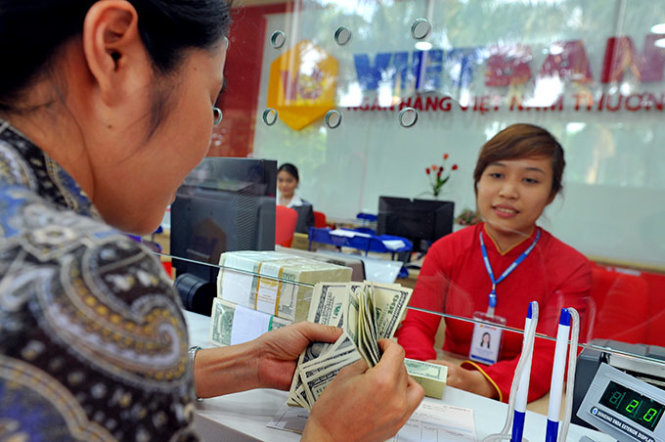The U.S. dollar has kept appreciating against the local currency, the Vietnamese dong, following a trend that started last month despite a recent announcement about a consistent foreign exchange rate policy from the State Bank of Vietnam (SBV).
The greenback had continued its rising momentum that began in the middle of last week, gaining VND20 per dollar day on day by the end of Friday.
The bid and ask price quoted at local state-run and joint-stock commercial banks stood at VND21,550-21,570 and VND21,610-21,635 to the dollar respectively.
Meanwhile, bid and ask prices demanded by the transaction offices of the SBV were maintained at VND21,350 and VND21,600 to the dollar.
The selling price of the greenback was then around VND40 away from the cap set by the SBV.
On Wednesday and Thursday last week, the greenback gained VND 30-40, depending on each bank. As compared with the previous week, each dollar increased by VND75-80.
This is the second wave of U.S. dollar appreciation against the Vietnamese dong since the beginning of this year.
Last week, the central bank re-confirmed that the official exchange rate between the two currencies will remain stable and attributed recent fluctuations to psychological effects rather than a supply-demand imbalance.
It is needless to worry about such a situation, an SBV representative said at a press conference in Hanoi on Wednesday last week.
"When the foreign exchange rate continues to fluctuate within the ceiling set by the SBV, at VND21,673 to the dollar, there is no need to worry about a shortage of supply or demand," Deputy Governor Nguyen Thi Hong said.
This time, the message from the SBV remained unchanged from the one issued after the first wave, which was a sharp increase in foreign exchange rates following the appreciation of the greenback on the world market in the middle of last month.
The strengthening dollar has sparked public concerns over further depreciation of the Vietnamese dong, which was devalued by one percent to VND21,458 to the dollar on January 7.
The price of the greenback quoted at state-run Vietcombank, often considered the benchmark for other joint-stock commercial banks, rose VND125 per dollar to VND21,450-21,510 for bid and ask in the first wave. The rise in value of the greenback has driven a series of central banks around the world to devalue their currency.
On March 11, Thailand became at least the 23rd central bank to pull the plug on monetary easing this year, getting its shots in before the Federal Reserve was forecast to raise interest rates, Bloomberg reported.
Although the exchange rate development is not very positive for the local currency, local experts said the central bank does not need to officially devalue the dong.
Instead, with $36 billion in foreign exchange reserves, the SBV may intervene by selling more dollars to the market temporarily to rebalance the supply and demand mechanism, if any, and then buying back the greenback from the market as it successfully did last year.
Like us on Facebook or follow us on Twitter to get the latest news about Vietnam!


















































